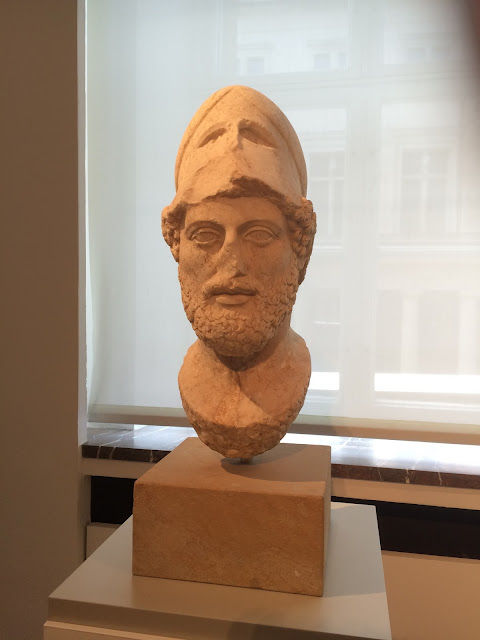 |
| The archaeological museum of Berlin. One of the 5 museums of the Museum Island in Berlin. |
 |
| A child helps a drunk person to vomit. |
 |
| Pericles the great Athenean statesman who led Athens during Golden age. |
 |
| A Persian soldier |
 |
| Another Persian soldier |
 |
| Achilles receives his new weapons made by god Hephaestus himself |
 |
| A Greek hoplite |
 |
| Satyrs were a popular theme in vase drawing. |
 |
| Satyrs were most of the times depicted sexually teasing women |
 |
| This vase depicts a young woman dancing to the rythm of the double flute |
 |
| A marble lion |
 |
| Gravestones depictes the diceased and their families. Some other times it depicted abstract themes. |
 |
| This gravestone depicts three soldiers |
 |
| This vase depicts a theatrical performance in ancient Greece. |
 |
| Roman era statues become more detailed. |
 |
| The bust of King Antiochus of the Kingdom of the Seleucids(Syria) |
 |
| Alexander the Great |
 |
| The presence of black African people in Ancient Greece is a long debated subject. Here is a bust that clearly shows an African face. |
 |
| Bust of the philosopher Epicurus |
 |
| Sol invictus was the ultimate deity of the Roman imperial era. |
 |
| Two Greek heroes of the Trojan war play some sort of table game under the surveillance of goddess Athena. |
 |
| Hecules fights Antaeus and raises him from the ground,from which Antaeus was drawing strength, |
 |
| The Athenean hero Theseus slays the Minotaur. |
 |
| Again two Hoplites play the same board game. |
 |
| Olive collection from trees. |
 |
| Coins depicting King and Queens of the Ptolemaic dynasty which ruled Hellenistic Egypt. |
 |
| These coins depict Greeks from the west. Important people from the Greek colonies in Italy and Sicily. |
 |
| These coins depict the Greek Kings of the Indo-Bactrian kingdom(Nowadays Afghanistan) |
 |
| The Seleucid dynasty coins. |
 |
| Depictions of Alexander the Great in coins. |
 |
| A ancient Greek hoplite helmet. |
 |
| Phallic symbols were common in Antiquity. |












No comments:
Post a Comment